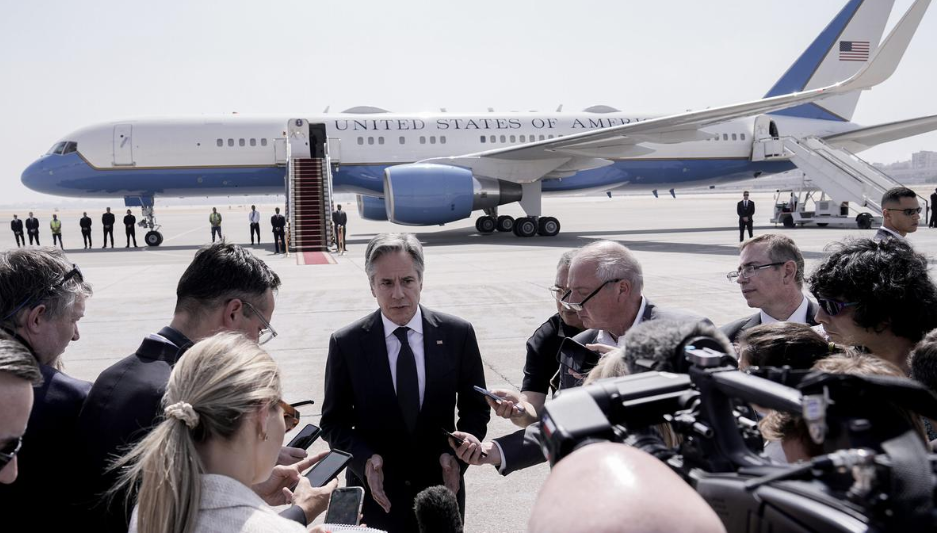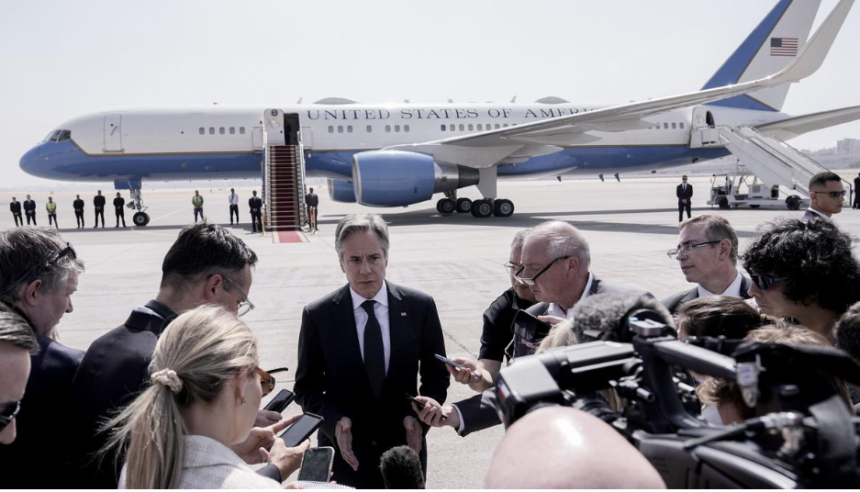Blinken in Asia to Push for Gaza Ceasefire as Israeli Troops Advance:-
Blinken in Asia In the midst of escalating violence and mounting casualties in Gaza, U.S. Secretary of State Antony Blinken has embarked on a crucial diplomatic mission to Asia. This journey, however, is not solely focused on the region’s usual economic and security issues. Instead, Blinken’s trip has taken on an urgent dimension: advocating for a ceasefire in Gaza as Israeli troops continue their advance.
The latest conflict between Israel and Hamas, the militant group controlling Gaza, has resulted in significant devastation and loss of life. Blinken’s diplomatic efforts aim to mitigate this humanitarian crisis, but the path to a ceasefire is fraught with complexities. This article delves into the intricate dynamics at play, the broader implications of Blinken’s mission, and the potential outcomes for the region.
The Context of Blinken’s Mission
The Blinken in Asia conflict in Gaza has flared up following a series of violent escalations, including rocket attacks by Hamas and extensive Israeli airstrikes. The violence has not only led to significant casualties but also exacerbated an already dire humanitarian situation. Amid this backdrop, Blinken’s visit to Asia, originally intended to strengthen U.S. alliances and discuss regional security, has taken on an additional and pressing objective: to garner international support for a ceasefire.
Diplomatic Maneuvers in Asia
In his meetings with Asian leaders, Blinken has emphasized the urgent need for a cessation of hostilities. His diplomatic strategy involves leveraging the influence of key Asian nations to pressure both Israel and Hamas into agreeing to a ceasefire. Countries like China, India, and Japan hold significant sway in international forums, and their support could be pivotal in achieving a diplomatic breakthrough.
Engaging China
China, as a permanent member of the United Nations Security Council, plays a crucial role in international diplomacy. Blinken’s discussions with Chinese officials have focused on encouraging Beijing to use its influence to push for an immediate ceasefire. Despite the often tense U.S.-China relations, there is a mutual interest in stabilizing the region and preventing further humanitarian disaster.
India’s Role
India, with its growing global influence, is another critical player. Blinken’s talks with Indian leaders have highlighted the need for a balanced approach to the conflict, acknowledging Israel’s right to self-defense while also stressing the importance of protecting civilian lives and ensuring humanitarian aid reaches those in need. India’s historical ties with both Israel and Palestine position it uniquely as a mediator in the conflict.
Japan’s Influence
Japan, a key U.S. ally, has also been a focal point in Blinken’s diplomatic efforts. The discussions have revolved around leveraging Japan’s economic and political influence to support a ceasefire. Japan’s commitment to peace and stability in the Middle East aligns with Blinken’s objectives, making it a vital partner in this endeavor.
The Broader Implications
Blinken’s mission goes beyond immediate conflict resolution; it also addresses the broader geopolitical implications. The Middle East’s stability is crucial for global energy supplies, and continued conflict could disrupt these supplies, affecting economies worldwide. Moreover, the humanitarian crisis in Gaza has triggered widespread condemnation, and a prolonged conflict could further damage the international community’s perception of both the U.S. and its allies.
Challenges and Roadblocks
Despite the urgency, achieving a ceasefire is fraught with challenges. The Blinken in Asia deep-seated animosities between Israel and Hamas, coupled with their differing strategic objectives, make negotiations extremely complex.  for more information click on this link
for more information click on this link
Israel’s Stance
Israel, citing the need to dismantle Hamas’ military infrastructure and protect its citizens from rocket attacks, has been reluctant to agree to a ceasefire without significant concessions from Hamas. The Israeli government’s position is shaped by domestic pressures and the desire to maintain a strong stance against terrorism.
Hamas’ Position
On the other side, Hamas demands the lifting of the blockade on Gaza and an end to Israeli airstrikes. The group’s leadership, facing its own internal and external pressures, views the conflict as a means to bolster its standing among Palestinians and within the broader Arab world.
The Humanitarian Crisis
As the violence continues, the humanitarian situation in Gaza deteriorates. Reports from international aid organizations paint a grim picture: hospitals overwhelmed with casualties, shortages of essential supplies, and thousands of families displaced from their homes. Blinken’s mission includes not just advocating for a ceasefire, but also ensuring that humanitarian aid can flow unimpeded into Gaza.
The Role of International Organizations
International organizations like the United Nations and the Red Cross are crucial in mediating the conflict and providing aid. Blinken in Asia discussions have included efforts to enhance the role of these organizations in facilitating a ceasefire and addressing the humanitarian needs of the affected populations.
Potential Outcomes
The success of Blinken in Asia mission hinges on several factors, including the willingness of Israel and Hamas to compromise and the support of key international players. A successful ceasefire could pave the way for renewed peace talks and a longer-term solution to the Israeli-Palestinian conflict. However, failure to achieve a ceasefire could lead to prolonged violence, increased regional instability, and further humanitarian suffering.
Conclusion
Antony Blinken in Asia diplomatic mission to Asia underscores the complexity and urgency of the Gaza conflict. By seeking the support of influential Asian nations, Blinken in Asia aims to create a united international front to pressure for a ceasefire. The success of this mission is not just crucial for the immediate cessation of violence but also for the broader goals of regional stability and humanitarian relief.
The Blinken in Asia in Asia path to peace in Gaza is undoubtedly challenging, requiring careful navigation of geopolitical dynamics, deep-rooted hostilities, and humanitarian imperatives. As Blinken in Asia continues his efforts, the international community watches closely, hoping for a resolution that can bring an end to the suffering and pave the way for lasting peace in the region. ALSO READ:- Divya Deshmukh Held to a Draw by Mariam Mkrtchyan but Continues to Lead Chess Tournament 2024





